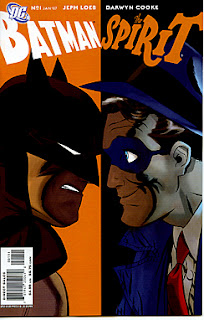Although I have read some trades and books by Will Eisner, I never actually read any of the original Spirit stuff, just the bits that appear in those other books. I'm still not even sure where to start (any tips?). However, I got a great almost first impression of the character from the 2007 Cooke run. Aside from the bits that appear in Comics & Sequential Art and Graphic Storytelling & Visual Narrative, the first proper Spirit comic I read was Batman / The Spirit, which was drawn by Cooke, but written by Jeph Loeb. It was somewhat campy and serious at the same time. The premise, a crime convention featuring the rogues gallery of both heroes, which happens at the same time and place of a Law Enforcement convention to which Commissioners Gordon and Dolan are assisting; is the type of stuff that you would expect from a Bewitched / I Dream of Jeannie, a Flintstones / Jetsons or a The Munsters / Adams Family crossover. However, it works in the sense that it celebrates the colorful worlds of Batman and the Spirit instead of trying to make them look grim. Remember that during most of their existance, they were not dark and bitter franchises.
Cooke's run goes on a slightly different direction. There's certain humor, folklore and lightheartedness, but this Spirit is more contemporary and relevant and less nostalgic, as I'm sure Eisner intended. While a XIX Century Cossack might look cartoonish in the XXI Century, a Russian mob boss that resembles one looks really cool. Like Batman: The Animated Series, the setting has a timeless aspect (mostly due to his drawing style), however, Darwin made sure we identify aspects of our world in it: brutal Middle Eastern dictators, terrorism, news media polarization (I loved the Colbert parody), American eating disorder and Mexican immigration problems.
 |
| The new Cossack and Mr. Carrion. |


All the characters take a prominent position in this run. We get to see the Central City world not only from the Spirit's point of view, but from those of Ebony, Ellen, Commissioner Dolan, P'Gell and Silk. I enjoyed how Denny (the Spirit), is already in a committed relationship with Ellen. I'm not a fan of romantic Ross-and-Rachel type of dramas; I prefer the cases to be the center of the crises.
 |
| Ebony White |
 |
| Madame P'Gell |
 |
| Ginger Coffee. |
The format is brilliant. There is a story arc, but every issue you get your money's worth with full, meaningful, stand alone stories. It is impressive how much you can get out of 22 pages when the writer actually cares. You buy the next issue because the quality is awesome, not because you got an incomplete pretext of a story and you need to know how it ends. Although Cooke only did the cover, the 7th issue takes this to an extreme: Three great stories of 8 pages each (Jordi Bernet would also be a great penciller for this title!). After Cooke left, they repeated that formula with issue #13 (Ty Templeton would also be a great penciller for this title!).
The bullet point in every cover does a great job describing the genre: "Action, mystery, adventure". Along with humor and noir, there's a bit of all of them without sticking to any. It's an eclectic mix, but more importantly, it's entertaining.
(No, this doesn't have much to do with the Elongated Man, but it's the type of approach that is needed to bring back classics like him).




I was just thinking about this book a few days ago and how much I miss it. I really need to re-read it. Cooke's style is, like you said, masterful, and I think he does a fine job of putting his own spin on the character and keeping true to Eisner.
ReplyDeleteThere's just something about Cooke's characterization that I love. For whatever reason, his characters ring so true to me. (I loved DC: New Frontier as well.)
Have you read "The Best of the Spirit" graphic novel?
Nope. Before this run, I only knew the Spirit from the short stories included in some of Eisner's books, like Comics & Sequential Art. I wouldn't know were to start collecting.
ReplyDeleteI'm also a big Cooke fan. He'd be my top choice for an Elongated Man mysteries series. He's so sophisticated, yet so respectful to the original material.